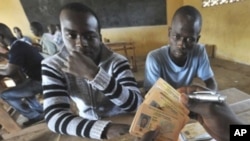Voters in rebel-held areas of Ivory Coast hope Sunday's much-delayed presidential election will reunify the country eight years after the start of civil war.
A regional peace accord ended Ivory Coast's civil war and set the stage for presidential elections scheduled for Sunday. The deal left in place the physical divisions of that conflict with the authority of former rebels beginning just before the central city of Bouake.
Voter Kouassi Soungalo says that division has hurt the economy for people living outside central government control. So he is hoping this vote helps restore Ivory Coast's position as a regional economic leader, not a country hobbled by war.
Soungalo says there is a partition between government-controlled areas and areas under the command of the New Forces rebellion. Here in Bouake, all the development has stopped. Everything has stopped, he says. Everyone who lives here is considered a rebel. So Soungalo says it is important for this area that Ivory Coast put in place something that can give the country a way forward with everyone developing together harmoniously.
Street seller Fanta Doumbia says business never recovered after the war.
Doumbia says she walks around with her merchandise all day, and there are some days when she does not even earn one dollar. That wouldn't happen if Ivory Coast had peace, she says. The country was not like this before, and Doumbia says she is praying to God to give Ivorians a leader who can bring peace and run the country well.
Questions of identity have repeatedly postponed this vote. President Laurent Gbagbo dismissed his government and dissolved the electoral commission in February because he said hundreds of thousands of people had been illegally registered to vote, many in areas outside government control.
The New Forces rebellion began, in part, because people in the north felt the government in the south neglected a region that includes descendants of migrant workers from Mali and Burkina Faso. Sidike Konate is a deputy political director for the New Forces rebels.
Konate says the first hurdle was solving the question of identity and organizing free and transparent elections. The New Forces will meet after this election to rethink its status and the future of its cause. Konate says the group will not disappear. It will continue to function because it has popular support, he says, but in the future it will function not as a rebellion but as a political party.
Former rebel leader and current prime minister Guillaume Soro is not a candidate in this vote because he is too young to run for president. Soro and supporters of the New Forces movement expect to play a role not only in deciding how best to reunite the country but in determining its political future as well.
Voters in Rebel-Held Areas Hope Sunday's Election Reunites Ivory Coast




